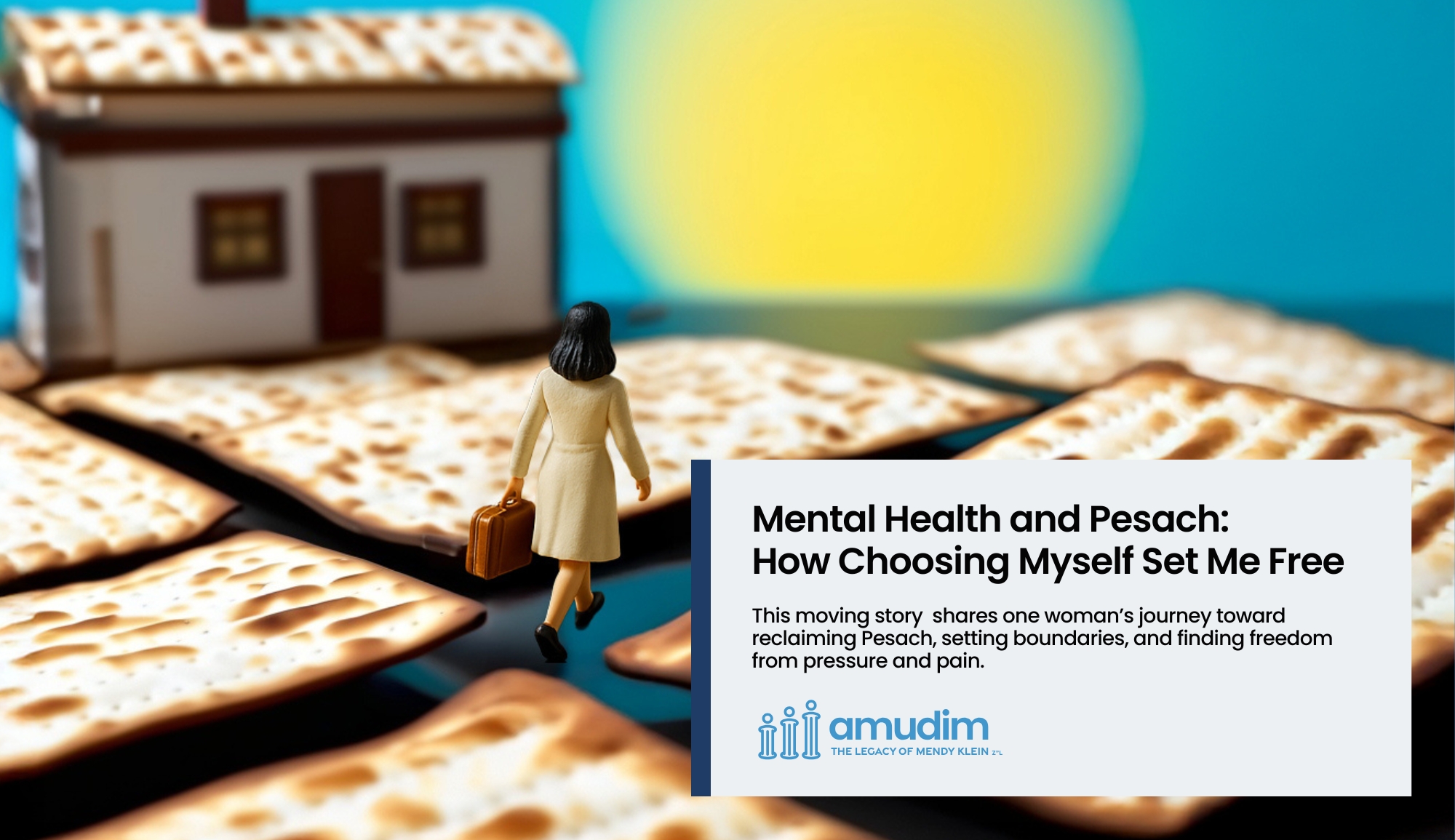
It was the year that everything felt too heavy, where I could feel the exhaustion in my bones.
I had just spent a full day helping my sister clean her house for Pesach, scrubbing and wiping until my fingers were raw. The smell of bleach was stuck in my nostrils, my back ached from bending over the countertops, and my head was spinning because I knew just how many things still needed to get done. Sitting on the floor of my tiny apartment that night, staring at the solitary plate of food I had just microwaved, a familiar wave of loneliness hit me.
Pesach was almost here. And, once again, I was spending Yom Tov sitting at someone else’s table, instead of my own.
Unspoken Pressures
Don’t get me wrong—I love my family. My parents, my siblings, my nieces and nephews are all amazing, but Pesach was like a flashing neon sign announcing to the world that I lived in a one bedroom apartment and didn’t have my own Seder to run. I knew that I was about to be thrust into a giant pressure cooker where I would be inundated with the same questions that I get asked every year.
"So, what’s new? Have you met anyone?"
"I heard about a great shidduch for you—are you interested?"
"Oh, it must be so nice to have so much free time, just for yourself!"
Clearly not a single member of my family noticed that I was drowning, and that I literally held my breath through every Yom Tov trying to keep a smile plastered on my face. As I sat there in my Pesach-cleaning clothes dreading the week ahead, I realized that unless I took matters into my own hands, I was destined to sit through endlessly draining sedarim, answering questions that were painfully invasive.
That moment was a game changer for me. Up until then, I felt that it was my job to show up for family time on Pesach, and that I would be grateful and helpful, making sure not to inconvenience anyone in any way. But somewhere in that commitment to being part of something larger than myself, I realized that I had gotten lost in the shuffle. It wasn’t okay that I was crying myself to sleep every time I slept in my childhood bedroom. I shouldn’t have been hiding out in the bathroom because my family was too emotionally draining. Pesach was supposed to be about redemption and joy, but I felt enslaved by familial obligations, and I just couldn’t do it anymore.
Finding My Voice
Realizing that I had to make my mental health a priority, I decided to try something new. I called my parents and told them that I would be staying with friends for part of Yom Tov instead of being at their house the whole time, not because I didn’t love them, but because I needed space. They were a little disappointed, but they understood that this was something I needed to do.
The changes continued throughout Pesach. I gave myself permission to skip meals when I felt overwhelmed, and to leave the table early if I didn’t feel like sitting through hours of conversation. And I allowed myself to be honest when people asked intrusive questions.
"Actually, dating has been really hard for me. Can we talk about something else?"
"I appreciate your concern, but I’m really happy with where I am right now."
"I’d love to hear how YOU’VE been instead!"
The craziest thing was that it worked. My parents and my siblings still loved me. My friends were thrilled to have me join them. And for the first time in years, I felt like an enormous weight had been lifted off my shoulders. I actually enjoyed Pesach and when I said the words "Vayotzi’ainu Hashem miMitzrayim b’yad chazakah u’b’zroah netuyah"—And Hashem took us out of Egypt with a strong hand and an outstretched arm” at the Seder, the proverbial light bulb went on over my head. I finally understood that freedom doesn’t happen when someone else pulls you out of your darkness. Freedom happens when you choose to step into the light.
And there I was, for the first time in my life, walking away from the darkness to a brighter and happier place.
Leaving Egypt, Leaving Expectations
That Pesach changed everything for me.
It didn’t make me less single or erase the pressures that existed in my life. It wasn’t like it even made Yom Tov easy, but it made me feel like I was in control of my life again. In a way, it was like the splitting of the Red Sea—a miracle that Hashem brought only after He saw us taking that first step on our own.
So many of us are trapped in an Egypt of a different sort—a situation that leaves us feeling chained and stifled. It might be that you’re single and tired of being the odd one out, your family dynamic is difficult, or the pressure of Pesach exacerbates your anxiety or depression. Whatever the case, you have the right to switch things up to make Pesach work for you. Find a smaller Seder if a big one is too overwhelming. Set boundaries if being with your family is triggering. Take a walk or just step away if you need quiet time. And, of course, ask for help if it’s all too much and you just aren’t managing.
Organizations like Amudim exist for exactly these moments—reminding us that our mental health matters and that no one should have to suffer in silence. Whether it’s guidance, resources, or just someone to listen, support is out there.
Pesach is about freedom—not just for the Jewish nation as a whole, but for each one of us individually. There is no reason to suffer just to be part of a community. And you don’t have to lose yourself because of other people’s expectations. Instead, ask yourself what you can do to leave Egypt behind and step into your own redemption.
Hashem’s outstretched arm is always there. All you have to do is reach out and take it.
If you or someone you know is struggling, please know you’re not alone—and getting help is one of the bravest things you can do. Visit www.amudim.org or call (646) 517-0222


